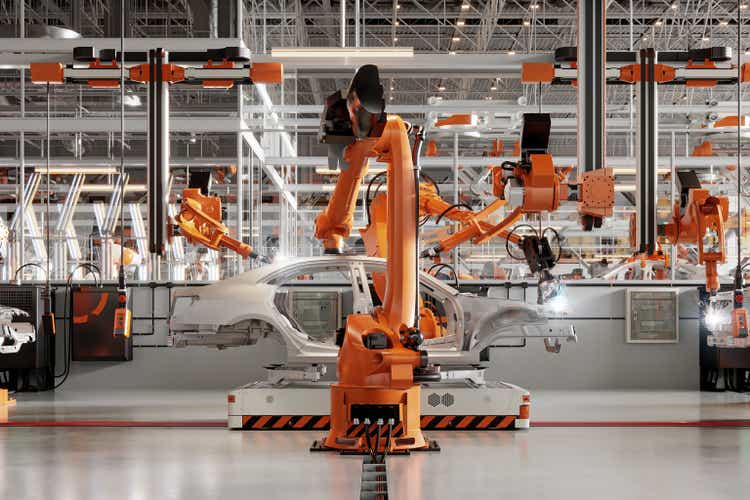alvarez
Listen below or on the go on Apple Podcasts and Spotify
Electric vehicles will be particularly hurt by the higher price of parts using copper. (0:15) Autodesk jumps on report of no PTC deal. (1:36) Powell calls for internal review of Fed building revamp. (2:33)
This is an abridged transcript of the podcast:
Our top story so far, Wells Fargo dove into the implications for the auto sector of the Trump Administration imposing a 50% tariff on copper imports from select countries, with the stated goal of protecting domestic industries and addressing trade imbalances.
Additional tariffs on auto imports and auto parts, particularly from Japan, South Korea, and other major trading partners, are set at 25% and may take effect August 1 unless new trade agreements are reached.
Analyst Colin Langan highlighted that copper is essential for wiring, motors, and battery components. He noted that higher copper prices due to tariffs will directly increase manufacturing costs for automakers, especially those producing electric vehicles, which require more copper than internal combustion engine vehicles.
Langan said the erratic nature of tariff policy has introduced price volatility and uncertainty, causing automakers and suppliers to delay capital purchases and inventory restocking. While U.S. automakers may be able to pass some increased costs to consumers, foreign automakers could see a significant decline in demand due to higher prices, potentially losing market share in the States.
On a broader scale, higher vehicle prices could dampen consumer demand, especially as discretionary spending is already pressured by inflation and rising interest rates. In response to the copper tariff threat, automakers are expected over time to accelerate efforts to source copper and other materials domestically or from countries with favorable trade agreements to mitigate tariff impacts.
Among active stocks, Autodesk (ADSK) is one of the biggest gainers in the S&P on a report that it is no longer considering an acquisition of Boston-based software company PTC (PTC).
Bloomberg says Autodesk has decided to drop its work on a potential cash-and-stock deal for PTC
Needham initiated coverage on Shopify (SHOP) with a Buy rating.
Analyst Scott Berg noted that while Shopify (SHOP) is widely considered a generational software company, he believes the company remains in only the mid-cycle of a durable growth opportunity. He highlights significant recent investments in international and B2B strategies seen as the most exciting of the company’s new growth drivers.
And BofA maintained its Buy rating on Salesforce (CRM) while taking a deep dive into the company’s largest business, Service Cloud. The firm has a $350 price target on the stock.
Analyst Brad Sills said Service Cloud is due for better growth in the coming quarters. Sills added that his estimate for fiscal 2026 Service Cloud revenue is $9.7 billion (+8% year over year), representing 25% of total subscription revenue.
In other news of note, Federal Reserve Chairman Jerome Powell has requested an internal review of the central bank’s $2.5 billion headquarters revamp.
The Fed’s costly renovation project has become a flashpoint in President Donald Trump’s push to oust Powell, who has been refusing to cave to Trump’s pressure to cut interest rates. The renovation would give Turmp a backdoor way to fire Powell for cause and retain a veneer of Fed independence.
Powell has tapped Fed Inspector General Michael Horowitz to reassess the price tag of the monetary authority’s long-planned project, Axios reported. He has also been asked to explore any other issues he finds relevant.
White House economic adviser Kevin Hassett suggested Sunday that Powell could be at risk of removal depending on answers related to the project, even though Trump has said that he does not seek to fire the Fed chief. Powell’s term ends in less than a year.
And in the Wall Street Research Corner, the Goldman Sachs derivatives research team identified 25 companies where their analyst consensus figures have the most difference – or are most “out-of-consensus” – with the Street and primed for the most upside or downside in their stock moves post earnings.
Implied moves in stocks this earnings season are the lowest in two years, with options expecting an average earnings move to be +/- 4.7%. That’s much lower from last quarter’s implied average of +/- 7.1%.
Among the names are:
Yum! Brands (YUM) with an implied move of 3.2% and 11% upside expected over the next 12 months.
Deere (DE), with an implied move of 4.5% and 20% upside expected over the next 12 months.
Take-Two Interactive (TTWO), with an implied move of 5.5% and 5% upside expected over the next 12 months.
And Southwest Airlines (LUV), with an implied move of 7% and 33% downside expected over the next 12 months.
#Wall #Street #Lunch #Copper #Import #Duties #Disrupt #U.S #Auto #Market #undefinedSHOP
